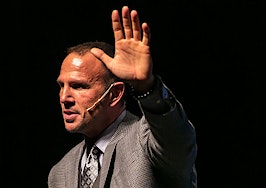If you are running a brokerage or team you’re responsible for setting the pace for the success of the agents. An essential part of of the process is to create yearly business plans and to measure performance throughout the year. My main goal with agents is to increase their production on a yearly basis so they are happy at my firm. But I also want to show off their achievements on social media, which helps to recruit more agents to my firm.
Here is the game plan we use to set a business plan for agents and measure their performance.
1. Assign business plan homework based on the previous year’s production.
We have a once-a-month meeting and once a year we spend about 20 minutes at one meeting assigning the homework and then another 30 minutes at the next meeting showing agents the results of the homework and the action plan needed to achieve their goals.
We use a program called BrokerFlow, which tracks the amount of units, production volume and lead source of each transaction. There are a couple of other transaction management platforms that do this such as BrokerSumo and Skyslope.
We’ve found the revenue and reporting from BrokerFlow to be ideal for our team. If you don’t subscribe to any of those services, you can export an agent’s production information by downloading the transactions off of MLS and having the agent put the source of the deals into a row labeled “lead source” and give them to your agents to use to fill out the next step.
2. Have your agent fill out a worksheet like this one that shows the yearly production goal
Your agent will estimate the percentage of buyer and seller meetings that result in a signed contract.
Example: Agent will meet with 30 buyers and I have a 75 percent of them sign a buyer representative agreement which will result in 22.5 buyer representatives. If the goal is 30, the agent will need to set 40 buyer appointments that year. The key to this is to not only have your agents know what their production goal is but the actions it will take to achieve that goal. This is going to be important in your one-on-one meetings with them down the road.
3. Line out a list of weekly tasks based on the actions of that goal and have your agents sign a commitment to doing this
There’s a lot of talk about “goal” in our industry and I still like the word but a goal is just a number. You’re going to need the agent to make a “commitment” to the actions that are needed to achieve the goals. It looks something like this:
Actions per week/month
Open houses: 2/month
Calls to past clients: 5/week
Calls to open house leads: 5/week
Calls to company leads: 25/week
Handwritten cards: 5/week
Lead generation: 20 hours/week
This will give the agents a basis to know what daily and weekly action steps they’re going to need to take to achieve their goals.
4. Start accountability groups
We’ve done this throughout this last year with our agents and it’s been a massive success.
The key here is that it has to be voluntary. The point of an accountability group is to get them in a group of their peers and have them come up with three micro-commitments that are composed of two business commitments and one personal commitment. Example: Call 10 leads a day; hold two open houses; work out three times a week.
You will meet once a week, go over the group’s commitments and pair them with a different partner each week. They are to check in with that partner every morning and see how each other is doing with their commitments. This will lead to moments of self-discovery and have agent push each other to achieve their goals. At the start of the weekly meeting you will go over what went well that week as well as what didn’t go well. Then they will assign themselves new commitments or re-commit to the previous week’s commitments. Dig deep.
Remember the action plans. You don’t want to have a lecture moment, but you also want to make sure that you are leading them to self-discovery by asking the right questions. If an agent says: “I want to make three listing appointments this week” then the leader of the group needs to ask: “OK, so how are you going to do that? How many calls do you think it would take to lead to three listing appointments?”
If they say “well, probably 30”, then you would ask “OK, so you want to make 30 calls as your commitment?”
Another note with this — if you can manage it, have someone other than you as the leader of the group. Remember that this group is not about teaching or lecturing. If someone doesn’t make the commitments, ask what action they can take to try to make them next week. You want your agents to comfortable enough in the group to be honest and vulnerable. There’s no better way for an agent to achieve better results than through self-discovery, so you want to create an environment that will help them achieve that.
5. Schedule professional development meetings
We try to schedule two per week so that we are meeting with each agent once every two months. We have a mix of seasoned top producing agents that are self-sufficient, as well as newer agents who work on our leads team. We do these with everyone. In these meetings we will pull up the goals spreadsheet and go over their goals and what income-producing actions they’ve been taking on a regular basis.
These meetings tend to be different based on the experience level of the agent. If they are seasoned, we’ll go into what they’re doing to induce referrals from past clients. Sometimes we go over farming techniques and offer to have our graphic designer try new postcard or Facebook images for them. We learn a lot about what our seasoned agents are doing and while the goal is to help them dig in and make their processes more efficient, we’ve also learned a few techniques from them that help us with the other agents. But more than anything, these meetings prove to our agents that we truly care about their success, and that goes a long way.
Building a successful team is tedious work and requires a lot of attention to your agents. It’s easy for a broker or team leader to get distracted and forget about some of the agents who don’t come in as much and are more self-sufficient. We’ve found that having a system like the one above ensures that we don’t have any of our people feeling like they’re not important.
Because when that happens, that’s the moment they begin to think about going somewhere else.
Ryan Rodenbeck is the broker-owner of Spyglass Realty and Investments in Austin. Connect with him on Instagram.
Are you ready for what the industry holds in 2020? Inman Connect New York is your key to unlocking opportunity in a changing market. At Connect you will gain insight into the future, discover new strategies and network with real estate’s best and brightest to accelerate your business. Create your 2020 success story at Inman Connect New York, January 28-31, 2019.
Agenda | Speakers | Past Connect Videos
Thinking of bringing your team? There are special onsite perks and discounts when you buy tickets together. Contact us to find out more.













